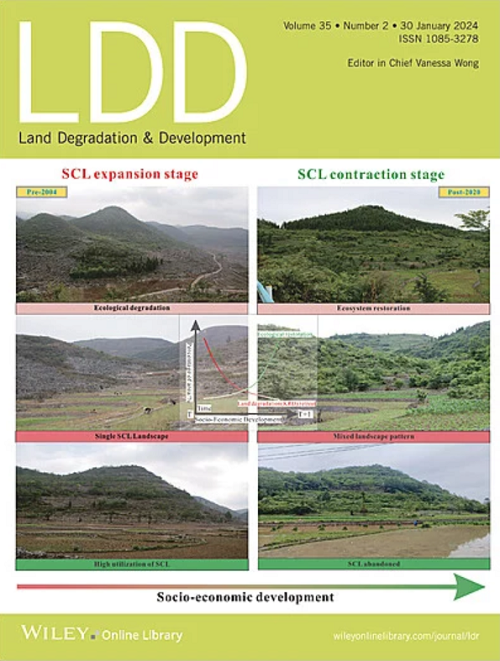Beyond Yield: Balancing Grain Production and Regulatory Ecosystem Services in a Typical Black‐Soil Region of Northeast China
IF 3.7
2区 农林科学
Q2 ENVIRONMENTAL SCIENCES
引用次数: 0
Abstract
China's northeastern black‐soil region is vital for grain production (GP) and is an important ecological barrier in China. Population growth in China has increased the demand for grain, intensifying the competition between arable and ecological land, which may lead to the homogenization and degradation of ecosystem services (ESs) in the black‐soil region's spatial units. However, studies on the trade‐offs among ESs on high‐quality cropland, as well as the spatially explicit mechanisms driving these trade‐offs and synergies, remain insufficient, especially when considering subtle changes in cropland spatial units and environmental heterogeneity. This study investigated the trade‐offs and synergistic relationships between GP and regulatory ecosystem services (RESs) in Northeast China's black‐soil region from 2000 to 2020, and explored the impact mechanisms of these trade‐offs based on the Geodetector and MGWR method. The results showed that all four types of ESs improved over the 20 years, and the total amount of GP and sand fixation (SF) showed a significant upward trend. The relationship between GP and both carbon sequestration (CS) and soil conservation (SC) was mainly synergistic, while the relationship with SF showed a weak trade‐off. The trade‐off intensity between GP and RESs was influenced by multiple factors. Notably, the interaction between GP and CS exhibited a more pronounced dependence on Leaf Area Index dynamics, whereas the trade‐off intensity with both SC and SF was predominantly governed by land‐use intensity patterns. This study serves as a scientific basis for the stable development of regional GP and the optimization of ecological security.超越产量:东北典型黑土区粮食生产平衡与调控生态系统服务
中国东北黑土区是粮食生产的重要区域,也是中国重要的生态屏障。中国人口增长增加了对粮食的需求,加剧了耕地和生态用地之间的竞争,这可能导致黑土区空间单元生态系统服务的同质化和退化。然而,关于高质量农田生态系统之间的权衡,以及驱动这些权衡和协同效应的空间明确机制的研究仍然不足,特别是考虑到农田空间单元和环境异质性的微妙变化。基于地理探测器和MGWR方法,研究了2000 - 2020年东北黑土地区GP与调节生态系统服务(RESs)之间的权衡与协同关系,并探讨了这种权衡的影响机制。结果表明:20 a来,4种类型的土壤固沙量均有所增加,土壤固沙总量和土壤固沙量均呈显著上升趋势;GP与固碳(CS)和土壤保持(SC)之间的关系主要是协同关系,而与顺丰之间的关系则表现为微弱的权衡关系。GP和RESs之间的权衡强度受多种因素的影响。值得注意的是,草木和草木之间的相互作用对叶面积指数动态的依赖更为明显,而草木和草木之间的权衡强度主要受土地利用强度模式的支配。该研究为区域GP的稳定发展和生态安全优化提供了科学依据。
本文章由计算机程序翻译,如有差异,请以英文原文为准。
求助全文
约1分钟内获得全文
求助全文
来源期刊

Land Degradation & Development
农林科学-环境科学
CiteScore
7.70
自引率
8.50%
发文量
379
审稿时长
5.5 months
期刊介绍:
Land Degradation & Development is an international journal which seeks to promote rational study of the recognition, monitoring, control and rehabilitation of degradation in terrestrial environments. The journal focuses on:
- what land degradation is;
- what causes land degradation;
- the impacts of land degradation
- the scale of land degradation;
- the history, current status or future trends of land degradation;
- avoidance, mitigation and control of land degradation;
- remedial actions to rehabilitate or restore degraded land;
- sustainable land management.
 求助内容:
求助内容: 应助结果提醒方式:
应助结果提醒方式:


